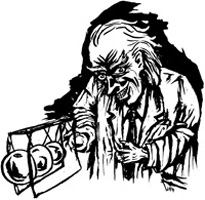 The Musings of Dr. Panglossian
The Musings of Dr. Panglossian
by Kerry Joyce
illustration by Jef Taylor
There’s No Time Like The Present. Or Is There?
A wayward nephew of mine recently went to see a feature length motion picture called 12 Monkeys. The story, it seems, involves time travel. Frankly, he bored me. The only reason I didn’t interrupt his painsgiving retelling of this film, is that he happened to be standing on the ledge of a seventh-story window at a Holiday Inn and was threatening to jump.
How do these ingredients (the idea of time travel, a movie called 12 Monkeys, and a couple of filched hotel towels), all figure into my nephew’s temporary desire to bungee jump (sans bungee) from a seventh-story ledge? That is a question best left to his psychiatrist, I concluded.
But my nephew’s, shall we say, overwrought presentation of this particular film’s plotline, did get me to thinking about something: That one of the most commonly-shared delusions of the human race presently is our dogged misperception of time.
Because we cannot view the past as we once did, we conclude that it has perished when really it is only our ability to perceive it as fully as we once did that has perished. We ascribe the same kind of death to the past that we observe in nature’s living things. The past is gone, we believe, even as archaeologists speak to us of “uncovering” it and historians claim to “explore” it.
True, their renderings are only a rough approximation of the past, but so too is our view of the present. The difference is one of degree, not of kind.
What of the future? The future exists already in all its wondrous detail, yet we relegate it to the staus of non-existence, as we do the past, because, like the past, we cannot experience it as directly or as fully as the present, but also because of our unfounded faith in the notion of “free will.”
Supposedly, the future does not exist yet because free-acting people are in the process of shaping it. Theoretically, all of the people heading down to Cape Cod this Memorial Day weekend could hear the impassioned plea of a rogue DJ on their car radios, and everyone could turn off at some exit before the Bourne Bridge, changing the fate of a few T-Shirt vendors and hotel owners for all time.
But actually, people have no free will. Like animals, they simply respond to stimuli. Even if people can control what they do, they cannot control the selection of the beliefs governing their actions anymore than they can choose to enjoy sardines, jalapeno peppers, or celery. You can agree with me or not. You cannot choose to agree with me or not.
Individual belief comes from externally derived knowledge and experience, social conditioning, (or lack thereof), instinct, brain chemistry, and other factors beyond individual human beings’ own will.
Generally, people who try to convince you that you are the captain of your own destiny are interested in making you a crew member of theirs.
Human beings are far too complex and inscrutable for all of their individual actions to be predicted, and it isn’t worth the bother anyway. The sometimes surprising nature of human behavior makes most people conclude falsely that people are in some way exercising free will.
Science, including social science, is constantly improving its ability to predict future events. Our friends at Coca-Cola, for example, cannot pinpoint the exact impact, but they do know with certainty that sales of Classic Coke will go down measurably, if they do not invest a certain number of millions in their carbonated swill each year. They can gauge the effects of their advertising fairly accurately, however, and will likely be even better at it next year. The primary unknown is the seductive power of their hired talent compared with that of Pepsi’s.
Like commercial fishing, the business of mass media is based on the knowledge that individual cases aren’t worth troubling over. Did you ever wonder why the biggest TV stations are called “net-works?” The reason is that, for all intents and purposes, the viewers are merely a school of flounder.
The “scientific method,” which is the cornerstone of our technology, is based on the premise that the future can be predicted. In fact, until results are predictably duplicated, any theory is regarded as “unproven” by the scientific community. Every future event could be predicted if only every pertinent fact about its cause were known and understood in advance. “Predict,” then, in the scientific sense, is just a fancy word for measure, and how can we measure something that doesn’t in fact exist?
What scientists really do when they predict something is measure what is already happening – something they will be able to observe and measure more directly when they arrive at their destination, which is the future.
Particularly as we get older, very few events are unexpected. The unexpected is so rare that it is sold to us in newspapers and magazines, and synthesized through comedy and drama.
Our memories are filled with experiences of the unexpected. Our terror and delight at the surprising is probably a survival mechanism. These are learning experiences that help ensure that we are not caught off guard again by a similar experience at a later point.
Those who do the unexpectedly delightful (innovators) are rewarded, and only sometimes persecuted, while those who do the unexpectedly grotesque are shunned and punished and only rarely celebrated.
Yes, the details of the future exist already in all their wondrous complexity. All surprises are merely the product of ignorance. That’s one reason why know-it-alls hate to be surprised.
We arrive at the future every second. We can make out much of its shape, but still we deny its existence. Of course, we didn’t acknowledge the existence of Earth either until after the human race inhabited it, although our planet preceded our existance.
The bridge between past and present, present and future is knowledge (stimuli), but because these bridges are not as extensive as those of the present with itself, scientists religiously deny the fixed existence of these realms.
Technologists, who make most frequent use of the scientific method, tend to overemphasize that which can be measured directly to the exclusion of those things which cannot. But the amoeba did not suddenly spring up through spontaneous generation the day the microscope was invented. These delightful creatures were there in our drinking water all along, inflaming our livers with poetic insight. We just couldn’t see them is all. So it is with past and future.
But until the temperature of last week and next month can be probed with a glass thermometer and injected with various dyes and chemicals, the past will be considered by science extinct, the future not yet born. Though we often take the temperature of the past and future, we just use different tools.
Nonetheless, these same scientists continue their relentless erosion of the illusionary boundaries between past, present, and future. Every day, the past is recorded with greater accuracy and completeness, the details of the future mapped out with greater and greater precision. “Virtual Reality” is by definition the preservation of an event from the present that is recreated in the future in its manifold entirety.
Retro lives, most particularly in music, because music has the power to convey us through an inborn gateway to the past, particularly to the days of our adolesence and early adulthood.
One quality that distinguishes humans from other creatures is that animals are said to lack foreknowledge of their death. But their complete ignorance of mortality is more sensible than our misunderstanding of it. Time, like energy, can neither be created nor destroyed. A few scientists already know all of this and are having a hearty laugh at your expense in a basement alcove at MIT. I’m sure of it because I was (am) there. And yes, my unbalanced nephew remains poised on that seventh-story ledge forever. As do each of us, with our individual destinies and subdestinies, on into an Infiniti, or in my case, a Lexus. Goodbye.



